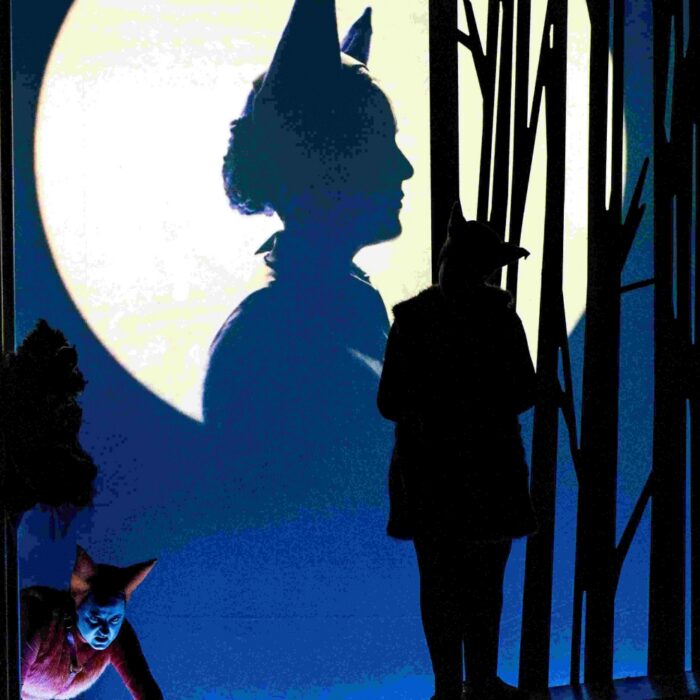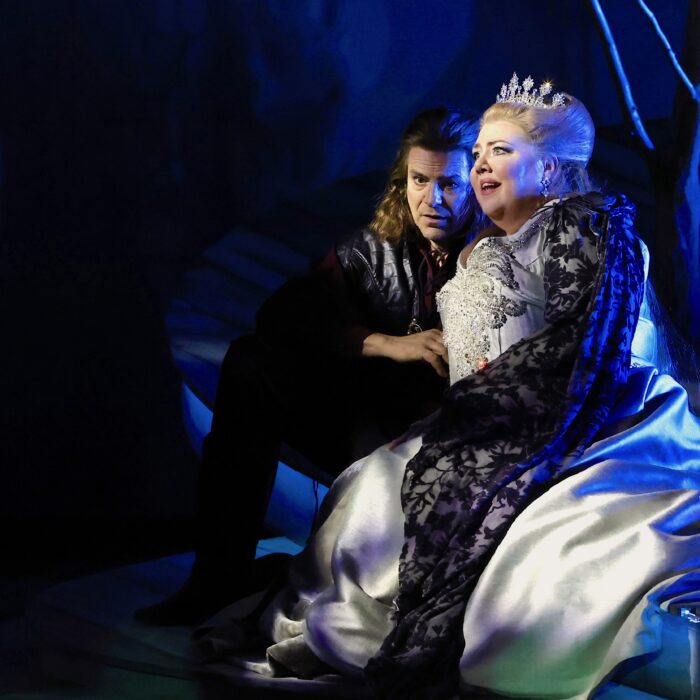
Hungarian State Opera New York Tour 2018 Review: The Queen of Sheba
Artists Weave Wonders with Hungarian Grand Opera
By Logan MartellFriday night of the Hungarian State Opera’s New York tour saw the performance of Karl Goldmark’s opera “The Queen of Sheba.” This under-performed work is firmly entrenched in the spirit of Romanticism, as Goldmark was a contemporary of figures such as Wagner, Berlioz, Rossini, Chopin, Verdi, and more. Many aspects of the opera, such as the plot, and structure of musical numbers, are highly conventional of the time; yet within this framework, Goldmark’s work excels in beautifully relating the story therein. Fully seizing upon this romantic spirit, Friday’s performance was a banquet for the eyes and ears.
Conductor Janos Kovacs describes the opera as “a kind of a mixture of French grand opera and early Romantic German opera, spiced with the ingenuity of composer Karl Goldmark and a strong oriental streak. I find this musical composition to be built upon a very interesting structure. All of the characters are given individual personalities, and a great deal of their emotions and actions are characteristic of the 19th century. However, what is perhaps the most important message to our own age is the possibility that anyone can lose themselves. And how difficult it may be to find ourselves again! Especially in our era, when things that earlier gave us support have become unstable. When ideas, including the religion that we previously relied on, are exchanged for the goods of a consumer society that tempt like ‘false idols’ – to use a Biblical expression. We tend to yield easily, which affects our personalities and even our relationships with ourselves.”
The opera begins in the lavish court of Israel’s King Solomon. Assad, who is engaged to be married to Sulamith, daughter of the High Priest, has had a sudden change of heart. On his journey escorting the Queen of Sheba to Solomon’s palace, Assad is enchanted after happening upon a bathing stranger of unparalleled beauty. When the Queen of Sheba unveils herself to Solomon, Assad recognizes her as the beautiful stranger, but the queen denies knowing him, throwing his heart, and the people of the court, into a frenzy. Despite her initial rejection, the queen soon reveals her love for Assad, and does everything in her power to lure him away from his engagement to Sulamith. While Assad is torn between his two loves, he finds the strength to reject the queen; having been exiled, he atones for blaspheming God and pleads for deliverance, which comes in the form of a sandstorm that allows him to die after reconciling with the grieving Sulamith.
Passion and Pain
As Assad, tenor Boldizsar Laszlo boldly navigated the tempest of dramatic and vocal strength needed of the role. The conflicted silence of his initial entrance, and his scorning of Sulamith, soon melted away when he confided in King Solomon what he experienced in meeting the stranger. In this strophic aria, he recalls the queen’s perfection, highlighted by the rapturously high B-flat Laszlo delivered. He sings the lyrics of the encounter again, reliving the spell in which he is wrapped. Among the many fervent climaxes in this number, the one he delivered with the phrase “I fell at the feet of the lovely sorceress,” was highly encapsulating and foreshadowed how he would come to worship the queen in time. While his character suffered greatly, one moment of great pleasure came in the first scene of the second act where he gives in to the queen’s seductions after being lured to the garden of the palace. The fevered peak of his love begged for release, as heard by the delicate high note that came with his request for her to cool his brow. This is followed by a powerful sting from the orchestra, as the queen pulls him into her passionate embrace with her silk garment; this particular moment was foreshadowed by the ballet which came before act one, where the female dancer wove a tantalizing display with aerial silks which the male found himself entangled within. After collapsing, Assad is found in the garden by the palace guard, and awakens very much in a loving daze, creating a brief moment of levity.
Opposite Laszlo was soprano Eszter Sumegi as Sulamith. While the opening choral number carried a reverent pomp to it, Sumegi soon brightened things with a jubilant enthusiasm regarding her upcoming nuptials. The following piece between her and the chorus employed loving yet exotic imagery within Sulamith’s phrases, such as when she describes Assad “nestling against me like a myrrh wreath,” and likening him to “a chalice full of balm.” While Sumegi addresses the gathering of women as a whole and as individuals, she also displayed the power to soar high above them and the orchestra during the climax of this number. During the confusion caused by Assad’s reaction to the queen’s unveiling, while Sumegi poured forth worried, comforting words to Assad, it undermined the moment that she was standing across the stage from him despite her phrase being “Assad, I’m pressing close to you!” This distance made a noticeable return at the very end of the opera, as Assad died in the foreground of the stage while Sulamith was on the lower stairs further in the background.
Royal Delights
As the eponymous Queen of Sheba, mezzo-soprano Erika Gal’s performance was as complex as it was captivating. When she arrived at Solomon’s palace her entrance was fittingly met with a shower of golden petals from above, but among her company were a number of ballet dancers dressed as creatures halfway between human and animal; their suggestive movements added profane undertones to the image of the queen as a figure of absolute beauty and luxury. In the first scene of the second act, Gal’s troubled recitative gently transitioned into an aria expressing the desire to win Assad for herself; the swift plucking of the harp at its highest reaches made for an ethereal compliment to Gal’s opulent mezzo-soprano. All these alluring qualities were soon undressed when she revealed the simultaneous desire to destroy Sulamith. Though she denies Assad once more at his wedding to Sulamith, leading to him committing blasphemy by declaring her as his goddess, the queen returns to haunt him at his most vulnerable in the fourth act. Among her temptations are phrases such as “my lips shall explain to you the never-understood psalm of love” which really illustrate the Queen of Sheba’s character as a seductress somewhere between Venus in Wagner’s “Tannhauser,” and the title character in Bizet’s “Carmen.” For all of the demanding nuances required by her alternating actions, Erika Gal remained highly enchanting through the night.
In the role of King Solomon, stalwart baritone Zoltan Kelemen proved himself able to reign in Assad’s madness and even rebuke the Queen of Sheba’s machinations. Despite holding all power as king of Israel, his decisions were often made after praying to God for clarity; these moments were often highlighted by a recurring motif from the lower brass section that could be said to represent judgment. When his entrance quells the uproar caused by Assad’s initial rejection of Sulamith, rather than hearing the accounts of those present, he divines the events that unfolded after a series of powerful call and response phrases with the orchestra Though Kelemen maintained a reverent presence, when Assad lost his composure upon seeing the queen, Solomon’s question of “Is there something wrong?” drew some laughs from the audience in an otherwise serious work. This role saw a number of extended phrases which emphasized the king’s even composure, a notable example of this being “and the pure hand of the virgin will bring heaven’s blessing upon you,” which came while supporting Assad during the wedding ceremony of Act 2.
A Passing Masterpiece
Karl Goldmark’s “The Queen of Sheba” is truly a rare opera, with the last production in New York being that of the Metropolitan Opera in 1906. In bringing this gorgeous work to the audiences of Lincoln Center’s David H. Koch Theater, the Hungarian State Opera triumphed as a result of their artistic direction as much as their artistic passion. Given the company’s tour which concludes this month, and the high likelihood that it may be years before another company decides to stage Goldmark’s work, Friday’s performance of “The Queen of Sheba” came as an intoxicating mirage that I hope will not be lost to the sands of time.


